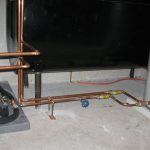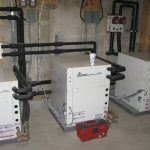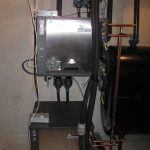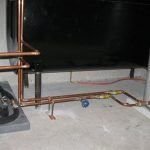Geothermal Heat Pump Installation & Repair
Powerful Energy Savings Is Just Below Your Feet
While some energy resources are limited, our planet’s ability to absorb the Sun’s heat energy provides an unlimited source of heating and cooling for your home.
- Geothermal Desuperheater connection
- Geothermal Heat pump Installation
- Geothermal heat pumps
- Geothermal Package heat pump
Because the Earth’s consistent underground temperature is ideal for most home’s heating and cooling needs, we can circulate the sun’s unlimited heat energy to keep our homes comfortable all year long, and NOT break the bank!
Geothermal energy is becoming more popular in homes and saving homeowners hundreds of dollars a year. Why? Geothermal systems provide a more energy efficient method to heating and cooling your house by using the Earth’s natural underground temperature. Recent studies conducted by the EPA and the U.S. National Renewable Energy Laboratory confirmed that geothermal energy is the most environmentally friendly alternative to standard HVAC systems.
How It Works
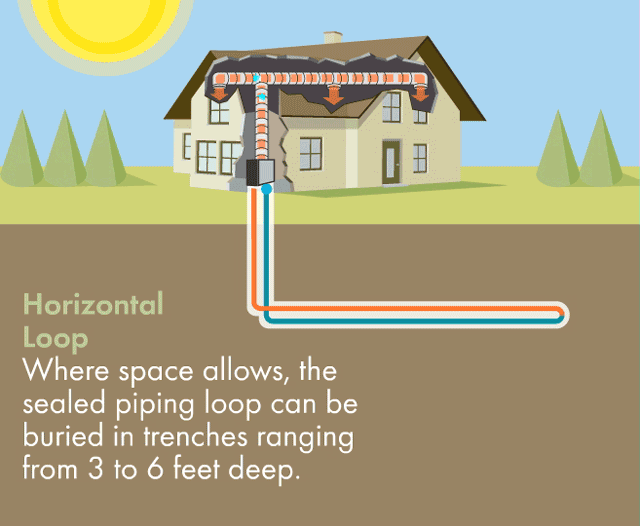 A geothermal heat pump is an electrically powered device that uses the Earth’s natural underground or groundwater temperatures to heat and cool your home or office. It operates similarly to a normal heat pump, but uses a different method in how it extracts heated and cooled air from outdoors. Long, fluid-filled pipes, called heat exchangers, are buried deep underground, running either horizontally or vertically—depending on the size of the property. Below the Earth’s 10-foot frost level, the ground maintains a moderately consistent temperature of about 54-degrees.
A geothermal heat pump is an electrically powered device that uses the Earth’s natural underground or groundwater temperatures to heat and cool your home or office. It operates similarly to a normal heat pump, but uses a different method in how it extracts heated and cooled air from outdoors. Long, fluid-filled pipes, called heat exchangers, are buried deep underground, running either horizontally or vertically—depending on the size of the property. Below the Earth’s 10-foot frost level, the ground maintains a moderately consistent temperature of about 54-degrees.
Winter Heating
In the winter, the fluid in underground pipes absorb heat. Because the fluid has a low boiling point, the evaporator inside the heat pump does not have to work as hard to turn the fluid into a gas, which is what produces the heat energy to warm your house. The second law of thermodynamics says that if a two surfaces of a different temperature meet, the hotter surface is cooled and the cooler surface is warmed. In this case, the hot surface is separated by the evaporator coil in your air handler or furnace. Heat is given off as a result of the cooler indoor air blowing against the heated coils. The hot gas cools, returns to a liquid, and is fed through the underground pipes to repeat the cycle.
Summer Cooling
Alternatively, the system works exactly in reverse during the summer. Just like an air conditioner, heat from inside you home passes through the furnace or air handler and is delivered to the heat pump unit. From there, the heat is sent to the underground pipes. Because the earth is significantly cooler in comparison to the hot summer air, the heat from the pipes dissipates, and the liquid refrigerant returns to a gas form when heat from inside meets the evaporator coils.
Why Go Geothermal?
Geothermal energy is becoming a hot topic in home energy solutions for a number of reasons:
- Underground temperatures are more consistent throughout the year. Because geothermal heat pumps do not have to work as hard to keep your home feeling comfortable, you will save significant amounts of money.
- Geothermal heat pumps should not require additional fuel-based HVAC systems, which can produce harmful air pollutants.
- Because of your environmentally conscious choice, you may qualify for a nice tax refund or finance rewards from the federal, state, and local government. Check with your local utility company or municipality to see what current programs are available.
While the cost benefits of geothermal energy systems are enough to make you jump on board, there are a few disadvantages to consider, including:
- High up-front installation costs and a complex installation process
- Logistical challenges regarding your property, specifically limited yard space, inaccessible yards, or non-existing yard
- Legal policies from your local municipality or utility company that prohibit the right to dig underground
- Interfering utility components such as plumbing, buried internet/cable wiring, and underground electricity lines.
WANT TO KNOW MORE ABOUT GEOTHERMAL ENERGY?
If you are interested in learning more about geothermal before you decide if it’s right for you, download this in-depth homeowner’s guide to geothermal from Climatemaster. It will answer most of your questions.

